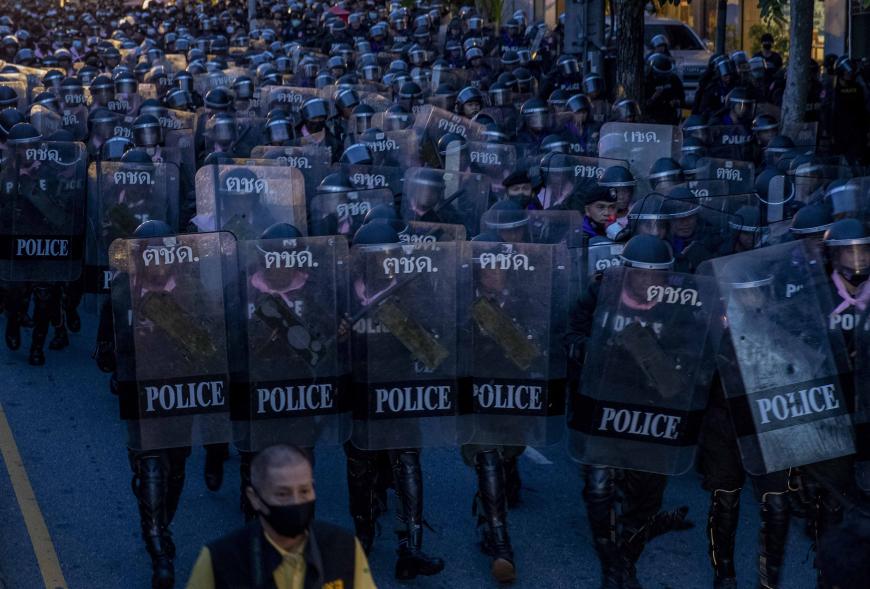
Oct 27, 2020
The ICJ today published a legal briefing analyzing the implementation of Thailand’s Emergency Decree on Public Administration in Emergency Situation B.E. 2548 (2005) in response to protests in 2020.
The ICJ welcomed the Thai government’s decision on 22 October 2020 to lift the Serious Emergency Situation in Bangkok but said the longstanding Emergency Decree of 2005 and emergency measures taken recently are non-compliant with Thailand’s international human rights obligations.
The legal briefing looks at restrictions in law and practice that were imposed under the Decree between 15 and 22 October 2020, after the “serious emergency situation” was declared by Thailand’s Prime Minister, in light of international human rights law.
The ICJ in the legal briefing recommends that Thailand should remove the criminal liability for the protesters who are prosecuted or at risk of prosecution under the Emergency Decree for merely exercising their rights to freedom of expression and assembly as guaranteed under international and Thai law.
During the protests between 13 and 22 October 2020, at least 90 people, including protest leaders, have reportedly been arrested, mostly for violating the Emergency Decree.
The ICJ urges Thailand to ensure that affected populations shall have access to judicial remedies in respect of alleged violations under the emergency laws. The regulations, notifications, decisions and actions of officials exercising powers under the emergency law during the “serious emergency situation” must be subject to review by the courts, and ensure the affected persons’ right to access to an effective remedy.
The legal briefing also underscores the need for Thailand to repeal and amend several provisions of the Emergency Decree.
The legal briefing focuses on four primary areas of concern, namely:
- the emergency power;
- the limited scrutiny by the courts;
- legal immunity from prosecution; and
- emergency decree measures.
Thailand is still under a nationwide state of emergency as part of the COVID 19 restrictions.
Background
On 15 October 2020, Thailand’s Prime Minister invoked the Emergency Decree declaring a “serious emergency situation” in the areas of Bangkok in response to the student-led anti-government protests that took place between 13 and 15 October 2020. Protesters called for the Prime Minister’s resignation, constitutional amendment and reform of the monarchy.
The Prime Minister, General Prayuth Chan-ocha, claimed that the declaration of the serious emergency situation was necessary to “end the situation in an efficient and prompt manner, to ensure compliance with the law, and to sustain national order and public interest”.
The restrictions included: prohibition of a gathering of five or more people, dissemination of publications or any means of communication containing texts which intend to distort information and instigate fear among the population. The competent officials, who may not be law enforcement officials, are, among other powers, authorized to arrest and detain persons suspected of having a role in causing the emergency situation, or being an instigator, a propagator, a supporter of such act or concealing relevant information relating to the act which caused the emergency situation; summon any person to report to the competent official; seize or attach arms, goods, consumer products, chemical products or any other materials; and prohibit any act or any instruction to perform an act to the extent that is necessary for maintaining the security of the state, the safety of the country or the safety of the population.
Nevertheless, protests in Thailand have continued despite government ban and efforts by the authorities to prevent them. On 16 October 2020, it was reported that polices forcibly dispersed peaceful protesters at Pathumwan intersection in Bangkok in which thousands of people, including many students, took part. Officials forcibly dispersed the protestors by using water cannons – which, according to the UN Guidance On Less-Lethal Weapons in Law Enforcement, should only be used in situations of serious public disorder where there is a significant likelihood of loss of life, serious injury or the widespread destruction of property. The water was laced with blue dye and an undisclosed chemical irritant to drive back protesters.
The state of serious emergency situation in Bangkok was lifted on 22 October 2020 by the Prime Minister, saying that the situation had eased and the violence was at an end.
In the legal briefing, the ICJ expressed concerned that the emergency declaration in response to the protests had activated provisions of the 2005 Decree that remain non-human rights compliant. The Decree has been used to impose a blanket restriction on freedom of expression and assembly by imposing a general ban on peaceful public demonstrations.
Download
Legal Briefing in English and Thai.
Further reading
Thailand: measures under the Emergency Decree to address the COVID-19 outbreak must conform to international law
More Power, Less Accountability: Thailand’s New Emergency Decree, August 2005
Implementation of Thailand’s Emergency Decree in Thailand’s Three Southern Provinces, July 2007
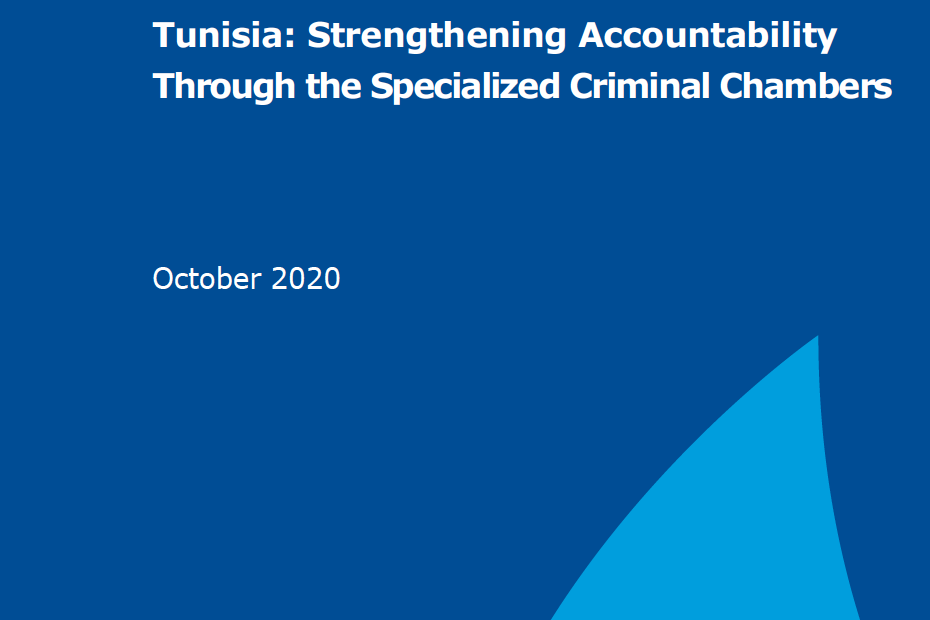
Oct 8, 2020
In a briefing paper published today, the ICJ called on the Tunisian authorities to comply with their international law obligations and undertake substantial legal and policy reforms, strengthening accountability and delivering justice to victims of gross human rights violations.
Reforms are particularly needed to enhance the effectiveness of the Specialized Criminal Chambers (SCC).
They are also required to ensure that Tunisia fulfills its obligations under international law to criminalize, investigate and prosecute gross human rights violations, and to ultimately guarantee the rights of victims to an effective remedy and reparation.
Organic Law No. 53 of 2013 established the SCC to adjudicate past gross human rights violations; they have been operating since May 2018 but are currently facing a number of hurdles. Urgent amendments to the Criminal Code, the Code of Criminal Procedure and other relevant domestic law, as well as institutional, judicial and policy reforms are required to overcome these obstacles.
“The conduct of SCC trials in the absence of these reforms risks to seriously impede their effective operation in the short term, and to hamper Tunisia’s accountability efforts in the long term,” said Said Benarbia, the ICJ’s MENA Programme Director.
“The success of the transitional justice process and the fight against impunity rests largely on the political will of the Tunisian authorities to introduce these reforms, and to ensure that the SCC are able to carry out their work without hindrance.”
Tunisia’s domestic law fails to adequately criminalize crimes under international law over which the SCC have jurisdiction. Further, the application of a special procedure under the transitional justice framework for the investigation and prosecution of gross human rights violations has resulted in the Office of Public Prosecutor and other investigative authorities playing little to no role in the prosecution of SCC cases. In addition, this special regime gives rise to concerns about the collection, admission, exclusion and assessment of evidence during the trial stages.
All these obstacles have the potential to adversely impact the fair trial rights of the accused, the victims’ right to an effective remedy and reparation, as well as the participation and protection of victims and witnesses at trial.
Additionally, Tunisia’s domestic law does not sufficiently guarantee the rights of the accused, nor does it fully ensure the rights of the victims and their families or adequate protective measures for victims and witnesses.
The briefing paper addresses these issues and makes key recommendations on three areas of outstanding concern, namely:
- Adequate criminalization of crimes under international law and applicability of the principle of legality and non-retroactivity;
- Investigation and prosecution of gross human rights violations; and
- Collection, admissibility and assessment of evidence in the investigation, prosecution and adjudication of gross human rights violations.
In addition, in light of the recent annual judicial rotation, which has resulted in many of the SCC not having quorums and on trials been delayed, the ICJ calls on the High Judicial Council to ensure that the SCC judges have security of tenure, and that annual rotations do not undermine the SCC’s ability to conduct their work and dispense justice and ensure accountability for decades of gross human rights violations in Tunisia.
“The High Judicial Council should rapidly fill the posts that are currently vacant in the SCC and ensure that newly appointed judges receive timely and adequate training in transitional justice, as required by Organic Law No. 53 of 2013,” said Kate Vigneswaran, the ICJ’s MENA Programme Senior Legal Adviser.
“Moreover, safeguards should be put in place to ensure that changes in the composition of the bench mid-way through trials do not prejudice the fairness of the proceedings, and to ensure that those judges who continue hearing cases have the appropriate understanding of the evidence and arguments.”
Contact:
Said Benarbia, Director, ICJ Middle East and North Africa Programme, t: +41-22-979-3817; e: said.benarbia(a)icj.org
Kate Vigneswaran, Senior Legal Adviser, ICJ Middle East and North Africa Programme, t: +31-62-489-4664; e: kate.vigneswaran(a)icj.org
Tunisia-Strengthening Accountability SCC-Advocacy-Analysis brief-2020-ENG (full paper in English, pdf)
Tunisia-Strengthen Accountability-News-2020-ARA (full story in Arabic, pdf)
Tunisia-Strengthening Accountability SCC-Advocacy-Analysis brief-2020-ARA (full paper in Arabic, pdf)
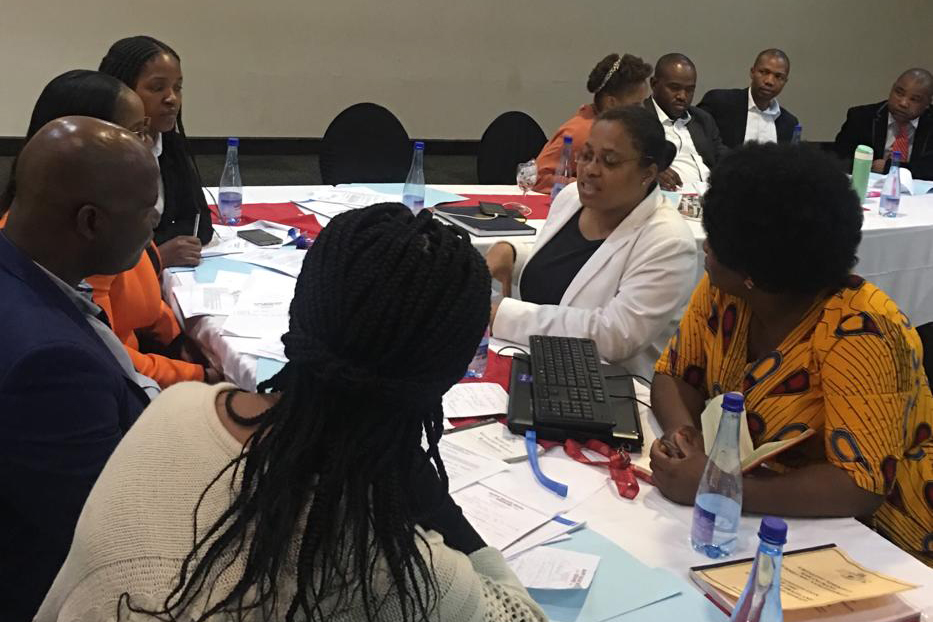
Oct 2, 2020
To assist in efforts to combat gender-based violence, the ICJ and Swaziland Action Group Against Abuse (SWAGAA) collaborated to create a guide on reporting gender-based violence for media practitioners in Eswatini.
The guide, designed by SWAGA, was launched on 2 October 2020 in a webinar attended by media practitioners from Eswatini.
Media practitioner, lecturer and trainer Pontsho Pilane gave an introduction to and answered questions about reporting gender-based violence. Her own interests include the intersection between health, race and gender.
Pilane said it was important for journalists to find different ways of presenting accounts in ways that are empowering to survivors and to readers and uphold the dignity of the most important people in the story: the survivors.
In her address, Pilane also highlighted the need for “solutions-based journalism” or reporting that focuses on adequate responses to social issues in addition to describing the problems themselves.
“Supporting survivors is crucial, as well as including things like how a survivor can find help and move forward from experiences with SGBV in our reporting,” she said.
It is also important to connect readers and survivors to NGOs like Swagaa who have the necessary tools to assist them.
In an effort to combat the various challenges presented by SGBV, the Kingdom of Eswatini introduced the Sexual Offences and Domestic Violence (SODV) Act in 2018.
Executive director of Swagaa Nonhlanhla Dlamini said the journey to enacting the SODV Act was a consultative one and that she was impressed with efforts by journalists in reporting on the Act.
“We hope that this manual will help journalists to improve their reporting on gender-based violence,” Dlamini said.
The Guide is intended as a valuable tool and resource as editors and journalists in Eswatini in supporting their collective efforts to contribute towards reporting which is respectful of survivors of gender-based violence, consistent with the law and contributes to ensuring a non-discriminatory public discourse on gender-based violence in Eswatini.
Read this guide with the ICJ Practitioner’s Guide No. 12 on Women’s Access to Justice for Gender-Based Violence and the ICJ Access to Justice: Challenges Faced by Victims and Survivors of Sexual and Gender-based Violence in Eswatini report.
Download
South Africa – Reporting GBV Guide – 2020 – ENG (full paper in PDF)
Contact
Shaazia Ebrahim (ICJ media officer), c: +27716706719 e: shaazia.ebrahim(a)icj.org
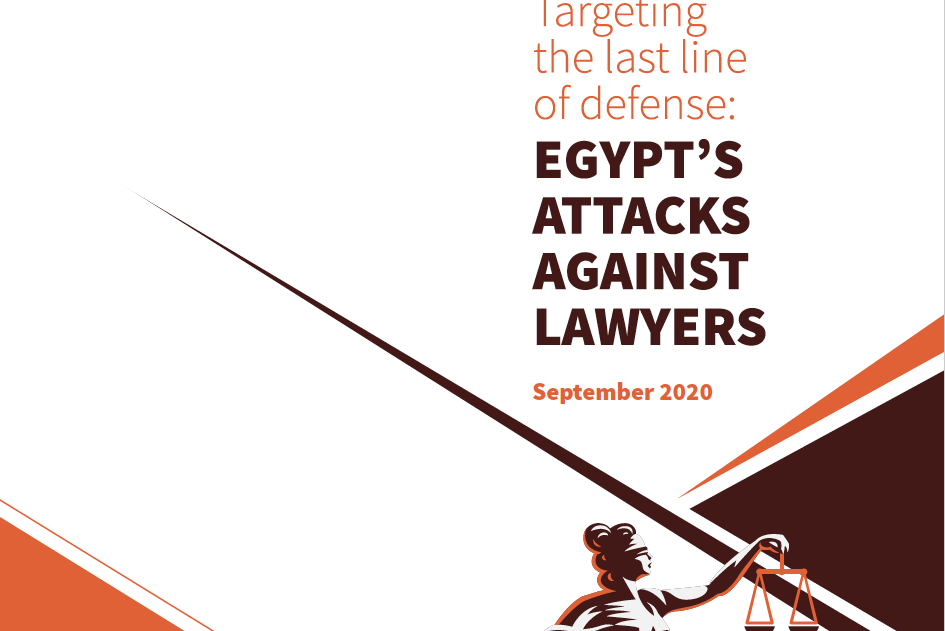
Sep 24, 2020
The ICJ and the Tahrir Institute for Middle East Policy (TIMEP) call on the Egyptian authorities to immediately end their crackdown on lawyers and unconditionally release all lawyers who are detained or convicted solely on the basis of the peaceful exercise of their...
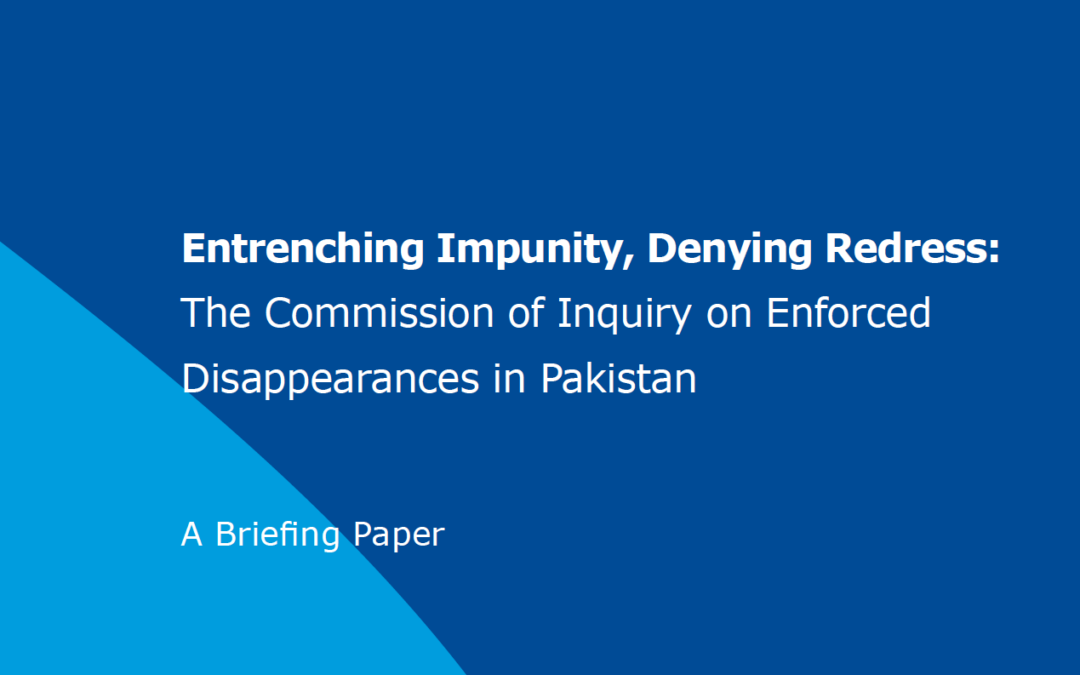
Sep 8, 2020
The Commission of Inquiry on Enforced Disappearances (COIED) has wholly failed to address entrenched impunity, leaving victims and their loved without any redress, the ICJ said in a briefing paper released today.
Pakistan’s Federal Government constituted the COIED in March 2011, with a mandate to, among other things, “trace the whereabouts of allegedly enforced disappeared persons” and “fix responsibility on individuals or organizations responsible.” While the Commission has “traced” the whereabouts of “missing persons” in a number of cases, there has been no apparent effort made to fix responsibility for this heinous crime.
“This Commission has failed in holding even a single perpetrator of enforced disappearance responsible in its nine years,” said Ian Seiderman, ICJ’s Legal and Policy Director.
“A Commission that does not address impunity, nor facilitate justice for victims and their families, can certainly not be considered effective.”
Hundreds, if not thousands, of people continue to be “missing” in Pakistan following their apparent arrest or abduction by or with complicity of the state. The UN Working Group on Enforced Disappearance has described a “culture of entrenched impunity” regarding the practice.
Despite the COIED’s failure in meeting its given objectives, its mandate was extended multiple times without any consultation with victims’ groups as to whether or under what conditions its operations should be continued. Its present mandate is set to expire on 14 September 2020.
This briefing paper provides an assessment of the performance of the COIED since its formation. It also evaluates the legal framework under which the Commission operates in light of international law and standards.
Some of the concerns about the Commission highlighted in the paper include:
- Lack of structural and functional independence
- No transparent criteria or process for the selection of commissioners
- Questions about the impartiality of the Commission’s Chairperson
- Flawed definition of enforced disappearance
- Limited scope of inquiry
- Inadequate victim and witness protection
- Failure to hold perpetrators accountable
- No public report on its work
Enforced disappearances are crimes under international law. All States have an obligation to promptly, thoroughly, impartially and effectively investigate allegations of enforced disappearance to bring those responsible to justice.
“The Government has used the Commission to deflect criticism and claim it is serious about addressing enforced disappearances,” added Seiderman.
“In reality, however, the COIED has led to a compromised inquiry process where investigations do not lead to accountability, nor do they result in proper and adequate reparation for victims.”
In light of the above, the ICJ has called on the Government not to extend the tenure of the existing COIED. Rather, the Government should hold real and meaningful consultations with all concerned stakeholders – including victims’ groups and human rights organizations – on the need for a new statutory commission that meets international standards.
The ICJ has also made a number of recommendations to the Government of Pakistan to provide for accountability for enforced disappearances; prevent them from occurring in the future; and provide reparations for victims and their families.
Contact
Ian Seiderman: ICJ’s Legal and Policy Director, e: ian.seiderman(a)icj.org
Reema Omer: ICJ’s Senior Legal Advisor, South Asia e: reema.omer(a)icj.org, +447889565691
Additional information
The WGEID has received 1144 cases of allegations of enforced disappearances from Pakistan between 1980 and 2019, of which some 731 remained unclarified as of May 2019.
The COIED has received 6752 cases since March 2011. Out of the these, 4642 cases have been “disposed of” for various reasons, and 2110 cases are still pending.
Download
Pakistan-Commission of Inquiry-Advocacy-Analysis Brief-2020-ENG (PDF)









